Due to non access of blogspot.com in China, I have now moved to new blog address.
Click : http://phototravel.aminus3.com/
Thank you for all your comments the past 2 1/2 years. Unfortunately, I am not able to read your blogs as long as I am stucked here in China.
Effective September 30, 2007.
Friday, September 28, 2007
Sunday, July 22, 2007
Life Around Tonle Sap Lake
Tonle Sap, the combined lake and river system is of huge importance to Cambodia. It is the largest freshwater lake in Southeast Asia.

Millions of people live on the floodplain around the Tonle Sap and there are a few hundreds floating villages on the lake itself.

Fishery is the dominant activity for the villagers of Tonle Sap. In fact, the lake system is one of the most productive inland fisheries in the world.

For most of the year the lake is a fairly small lake, only around one metre deep.

During the monsoon season, however, the Tonle Sap river which connects the lake with the Mekong river reverses its flow.

Water is pushed up from the Mekong into the lake, increasing its depth to up to nine metres, flooding nearby fields and forests. The floodplain as the results of the pulsing system provides a perfect breeding ground for fish.

Many kids were seen loitering everywhere. Many sell bananas hoping to earn some money. Please buy my bananas ! All they could say was the same "One dollar" and stuck out their pointer as indication.

During April, it was extremely hot out there in the lake. The kids looked very tanned and dark. I am sure it is hard life out there.

Foreign tourists were also approached quickly by beggar kids, hoping to get tips (money). According to our tour guide, these poor kids were Vietnamese.

Some of the kids used just small basins to paddle around to ask for money. It was sad sight that to see this kid has one lost limb.

The children go to a floating school nearby. It is good to see that at least these kids are given some sort of education despite the poor living conditions. But the school isn't big enough to accommodate all of them.

Some of these schools are often funded by foreign governments like Korea, Japan, etc. Seen here is a floating caged basketball court as above.

Initially I felt pity. It was a mixed feeling. I gave some of them money.
There is a great chance to volunteer, plenty of programs - an opportunity to participate in meaningful community service.
Check this site : Volunteer Abroad

Millions of people live on the floodplain around the Tonle Sap and there are a few hundreds floating villages on the lake itself.

Fishery is the dominant activity for the villagers of Tonle Sap. In fact, the lake system is one of the most productive inland fisheries in the world.

For most of the year the lake is a fairly small lake, only around one metre deep.

During the monsoon season, however, the Tonle Sap river which connects the lake with the Mekong river reverses its flow.

Water is pushed up from the Mekong into the lake, increasing its depth to up to nine metres, flooding nearby fields and forests. The floodplain as the results of the pulsing system provides a perfect breeding ground for fish.

Many kids were seen loitering everywhere. Many sell bananas hoping to earn some money. Please buy my bananas ! All they could say was the same "One dollar" and stuck out their pointer as indication.

During April, it was extremely hot out there in the lake. The kids looked very tanned and dark. I am sure it is hard life out there.

Foreign tourists were also approached quickly by beggar kids, hoping to get tips (money). According to our tour guide, these poor kids were Vietnamese.

Some of the kids used just small basins to paddle around to ask for money. It was sad sight that to see this kid has one lost limb.

The children go to a floating school nearby. It is good to see that at least these kids are given some sort of education despite the poor living conditions. But the school isn't big enough to accommodate all of them.

Some of these schools are often funded by foreign governments like Korea, Japan, etc. Seen here is a floating caged basketball court as above.

Initially I felt pity. It was a mixed feeling. I gave some of them money.
There is a great chance to volunteer, plenty of programs - an opportunity to participate in meaningful community service.
Check this site : Volunteer Abroad
Monday, July 09, 2007
Eye On Malaysia
In 2007, Malaysia celebrates its 50th year of nationhood. Hurray.
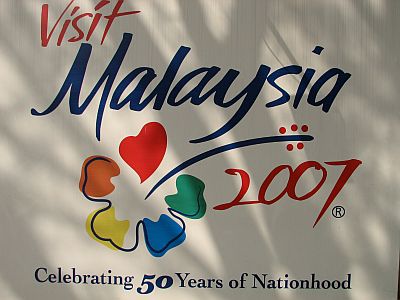
As part of Visit Malaysia Year 2007 is the iconic viewing wheel, as one of the 50 major attractions introduced by the Tourism Ministry to woo tourists.
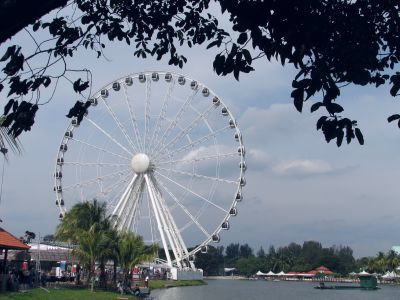
The Eye on Malaysia - the RM 30 million (wah, so expensive !!) ferris wheel that comprises of 42 gondolas (similar to the London Eye) is located at Titiwangsa Lake Gardens.
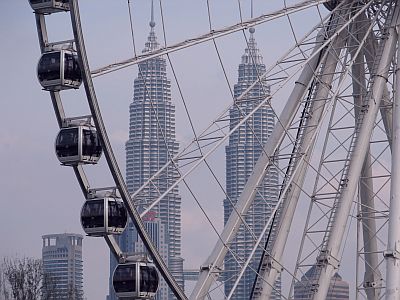
The wheel allows visitors to experience a 360-degree skyline view of Kuala Lumpur during a 12-minute ride that goes 60 metres high.
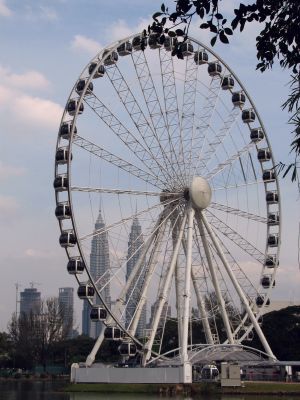
Eye on Malaysia, originally installed in Paris is quite a hit among locals and tourists.
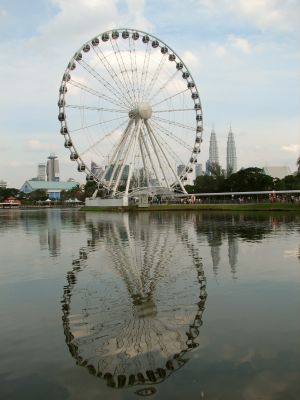
Although I have initially expected the ferris wheel to be larger and in fact, rather disappointed at first glance, but I quite like the reflection of the high structure on the Titiwangsa Lake.
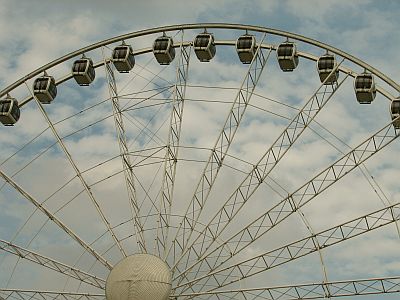
I did not get onto the EYE. I guess as a Malaysian, I should have for once at least. It was too hot that noon.
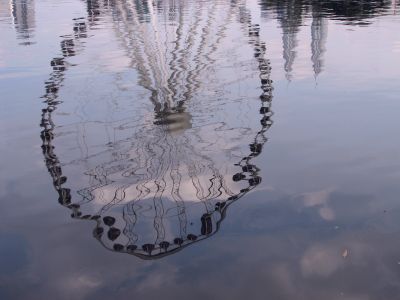
Another snapshot of the reflected ferris wheel from the lake. It would be nice to have some night shots and stayed on for the water and light displaying but I was a little too tired. It was another 2 - 3 hours wait. For pictures, do visit bloom, flowers, bloom - EYE on Malaysia.
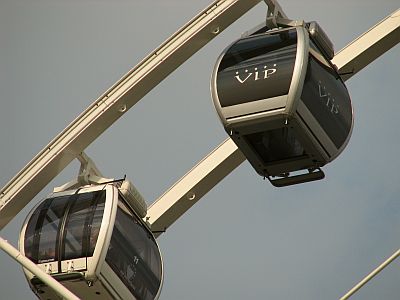
An exclusive VIP gondola has also been outfitted to include plush leather seats fit for a king, a mini fridge, a DVD player, a plasma TV and a mobile telephone.
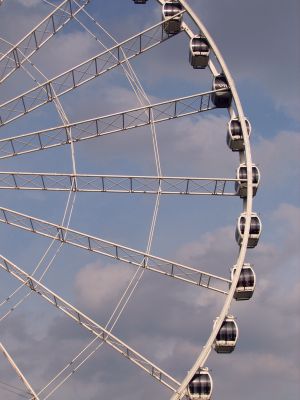
Apart from the gondola ride, one can also enjoy other attractions ie. the International Watersky Spectacular. Malaysia welcomes you.
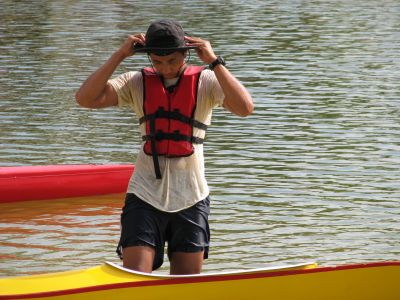
The park is also a good place for jogging, canoeing, "paktoh" and awhole lot of other activities.
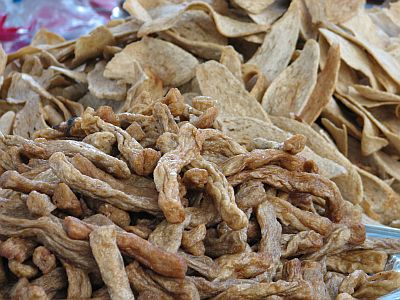
Made of fish meat that is grounded to a paste and mixed with sago flour, and then deep-fried, the keropok is crispy on the outside, chewy on the inside. One of my favorites and best eaten with sweet and spicy chilli sauce.
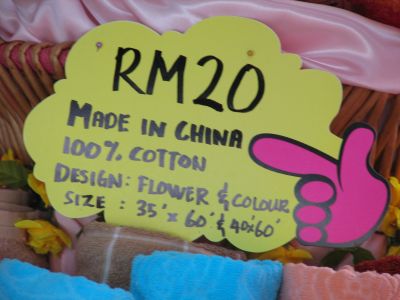
Eye on Malaysia but Made in China (alamak !). To some extent, it just can't help - "Made in China. Sold everywhere" - in today's world through globalization, China has rapidly become an economic superpower. A place where I will be heading next.

As part of Visit Malaysia Year 2007 is the iconic viewing wheel, as one of the 50 major attractions introduced by the Tourism Ministry to woo tourists.

The Eye on Malaysia - the RM 30 million (wah, so expensive !!) ferris wheel that comprises of 42 gondolas (similar to the London Eye) is located at Titiwangsa Lake Gardens.

The wheel allows visitors to experience a 360-degree skyline view of Kuala Lumpur during a 12-minute ride that goes 60 metres high.

Eye on Malaysia, originally installed in Paris is quite a hit among locals and tourists.

Although I have initially expected the ferris wheel to be larger and in fact, rather disappointed at first glance, but I quite like the reflection of the high structure on the Titiwangsa Lake.

I did not get onto the EYE. I guess as a Malaysian, I should have for once at least. It was too hot that noon.

Another snapshot of the reflected ferris wheel from the lake. It would be nice to have some night shots and stayed on for the water and light displaying but I was a little too tired. It was another 2 - 3 hours wait. For pictures, do visit bloom, flowers, bloom - EYE on Malaysia.

An exclusive VIP gondola has also been outfitted to include plush leather seats fit for a king, a mini fridge, a DVD player, a plasma TV and a mobile telephone.

Apart from the gondola ride, one can also enjoy other attractions ie. the International Watersky Spectacular. Malaysia welcomes you.

The park is also a good place for jogging, canoeing, "paktoh" and awhole lot of other activities.

Made of fish meat that is grounded to a paste and mixed with sago flour, and then deep-fried, the keropok is crispy on the outside, chewy on the inside. One of my favorites and best eaten with sweet and spicy chilli sauce.

Eye on Malaysia but Made in China (alamak !). To some extent, it just can't help - "Made in China. Sold everywhere" - in today's world through globalization, China has rapidly become an economic superpower. A place where I will be heading next.
Friday, July 06, 2007
Something to Talk About Part 4
I'd always liked this part of my blog. Occasionally there is something to talk about. It has been awhile since the last time, and I thought it would be nice to have another one now.
Something to Talk About Part 1
Something to Talk About Part 2
Something to Talk About Part 3
Many of us relate ambition with power, wealth, success and career. Many times, when asked what is our ambition, we will think of our career or something significant that we would like to achieve. However, some others may differ. Their ambition may just to be the best person he/she can be, do no avoidable harm to others. Can one say his/her ambition is to get married and have a happily ever after family ?
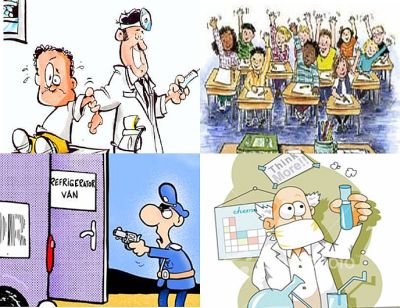
Ambition in fact a simple word but with BIG meanings - the desire, eagerness to achieve something, to be someone. And to have ambition, motivation always be present.
Can good ambition lead to bad consequences ? Can one be victim of having ambition ? Of course. Because ambition could cause people to go over limits and sometimes the ambition can be so big that people hurt themselves and others while trying to reach a goal.
Do you still have ambition ? Or are you lost now somewhere searching for new motivation ?
Did you remember the three choices you'd put in the list ? I wanted to become a doctor, or maybe a teacher or a policeman.
Is what you are now someone you aimed to be when you were a kid ? Is your ambition what your parents wanted you to be ? Ambition is part of our life. And ambition is essential.
Something to Talk About Part 1
Something to Talk About Part 2
Something to Talk About Part 3
Many of us relate ambition with power, wealth, success and career. Many times, when asked what is our ambition, we will think of our career or something significant that we would like to achieve. However, some others may differ. Their ambition may just to be the best person he/she can be, do no avoidable harm to others. Can one say his/her ambition is to get married and have a happily ever after family ?

Ambition in fact a simple word but with BIG meanings - the desire, eagerness to achieve something, to be someone. And to have ambition, motivation always be present.
Can good ambition lead to bad consequences ? Can one be victim of having ambition ? Of course. Because ambition could cause people to go over limits and sometimes the ambition can be so big that people hurt themselves and others while trying to reach a goal.
Do you still have ambition ? Or are you lost now somewhere searching for new motivation ?
Did you remember the three choices you'd put in the list ? I wanted to become a doctor, or maybe a teacher or a policeman.
Is what you are now someone you aimed to be when you were a kid ? Is your ambition what your parents wanted you to be ? Ambition is part of our life. And ambition is essential.
Monday, June 25, 2007
Trekking at FRIM
FRIM is our leading institution in tropical forestry research. The 600-ha site in Kepong is located 16 km northwest of Kuala Lumpur.
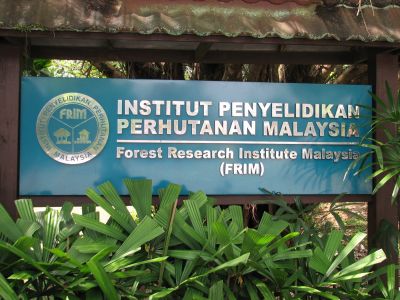
FRIM consists of three research divisions.
(1) The Forestry Division provides data, standards and guidelines for managing our natural forests on a sustainable basis.
(2) The Product Development Division focuses on the development of forest-based industries.
(3) The Biotechnology Division involves in creating new planting material through genetic engineering.
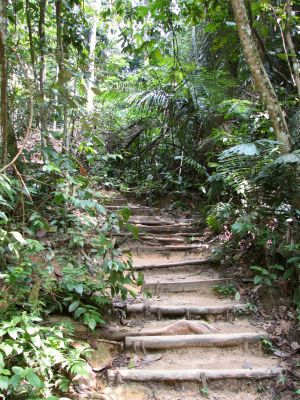
FRIM’s ‘forest tour packages’ provide opportunities for outdoor recreation (i.e. forest trekking) and public education in its grounds.
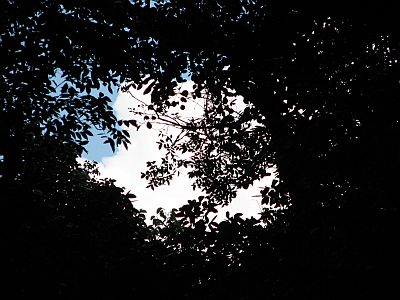
The look of the sky in dense forest of FRIM. It was a good day for forest trekking.
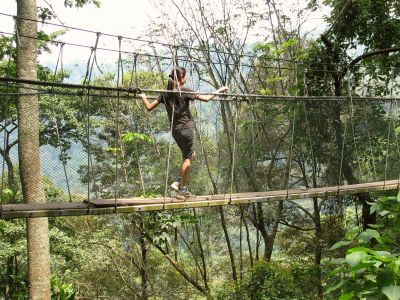
One of the main attractions is the Canopy Walkway which spans about 200 m and is suspended between trees at about 30 m above ground. The trail to the walkway is uphill, steep and physically demanding (about 30 - 45 mins).
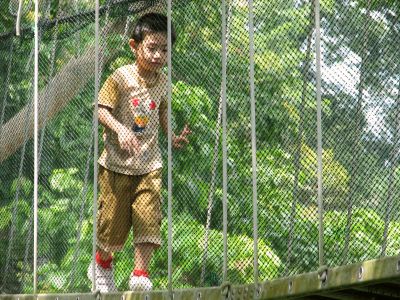
A small charge is levied for the visit;
(1) RM5 for adults
(2) RM3 for students (Age 13 onwards)
(3) RM1 for children (Age 7 - 12 yrs)
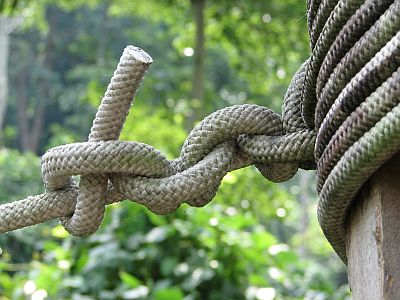
Despite that it is built with high quality ropes, visitors are advised to be at least 3 - 5 meters away from each other while on the canopy walkway.
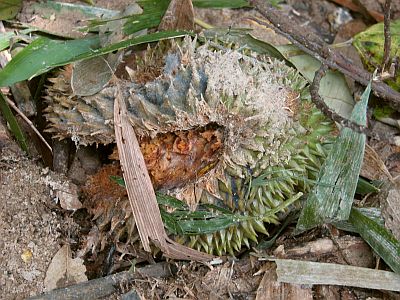
A fallen durian fruit. Plenty of them actually on the grounds of the trek trail.

Some kids - there is nothing much more fun than than outdoor fun with water.
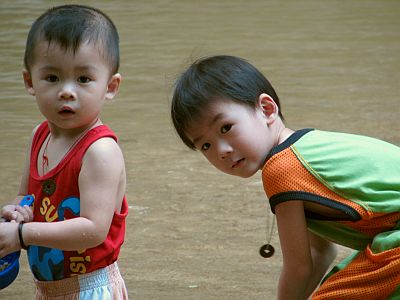
Looks like it is popular among the Chinese community as well (not to mention that I saw plenty of foreigners too).
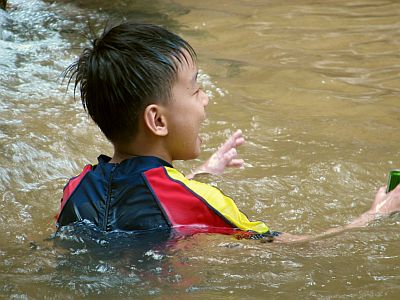
A kid seen here enjoying the cooling water from the nearby waterfall.
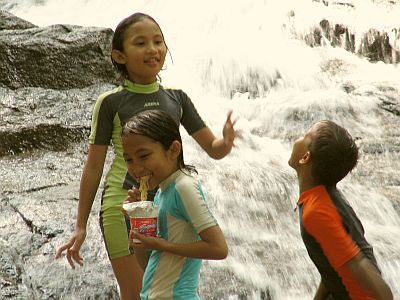
A small waterfall at Sungai Kroh with 2 little huts is ideal place for family day.
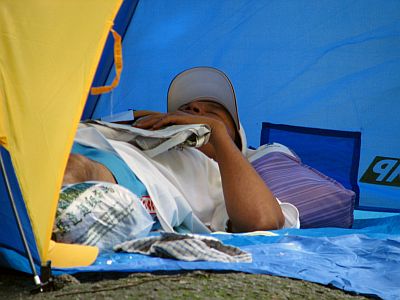
FRIM is a popular spot for picnickers, joggers, cyclers, tourists and nature study groups, for family day events, treasure hunts, camping, birdwatching, jungle trekking and as well as nature photography.
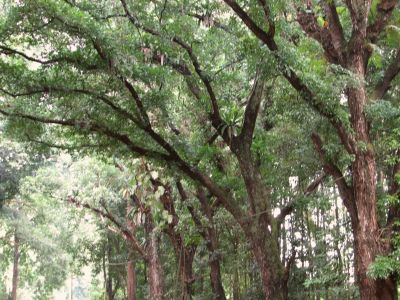
For me, it is a treasure of relatively unpolluted air, cooler temperatures and quiet serenity.
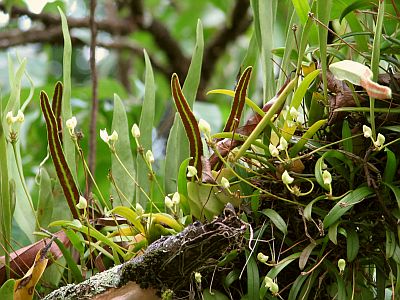
For the serious jogger, there are 2 tracks that wind through dense forest, plantation ground and laterite road that will surely test their endurance.
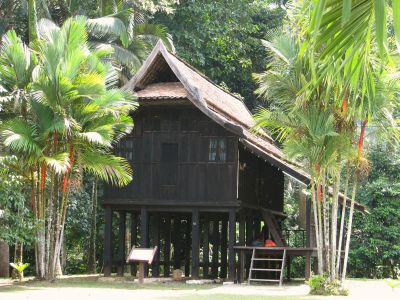
It was definitely some tough and long walks (there were no cabbies till to the main entrance of FRIM). I saw this traditional house on the way.
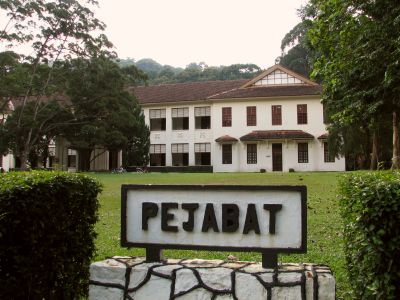
PEJABAT means office.
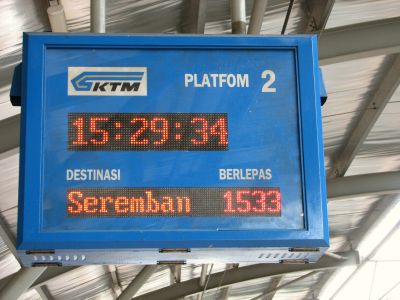
I did not drive. Took the KTM train to Kepong Central and a cab to FRIM. It was a good trip away from the hustle bustle of the city. And the heavy rain came only after the trekking. Pheewww.
More information : Forest Research Institute Malaysia

FRIM consists of three research divisions.
(1) The Forestry Division provides data, standards and guidelines for managing our natural forests on a sustainable basis.
(2) The Product Development Division focuses on the development of forest-based industries.
(3) The Biotechnology Division involves in creating new planting material through genetic engineering.

FRIM’s ‘forest tour packages’ provide opportunities for outdoor recreation (i.e. forest trekking) and public education in its grounds.

The look of the sky in dense forest of FRIM. It was a good day for forest trekking.

One of the main attractions is the Canopy Walkway which spans about 200 m and is suspended between trees at about 30 m above ground. The trail to the walkway is uphill, steep and physically demanding (about 30 - 45 mins).

A small charge is levied for the visit;
(1) RM5 for adults
(2) RM3 for students (Age 13 onwards)
(3) RM1 for children (Age 7 - 12 yrs)

Despite that it is built with high quality ropes, visitors are advised to be at least 3 - 5 meters away from each other while on the canopy walkway.

A fallen durian fruit. Plenty of them actually on the grounds of the trek trail.

Some kids - there is nothing much more fun than than outdoor fun with water.

Looks like it is popular among the Chinese community as well (not to mention that I saw plenty of foreigners too).

A kid seen here enjoying the cooling water from the nearby waterfall.

A small waterfall at Sungai Kroh with 2 little huts is ideal place for family day.

FRIM is a popular spot for picnickers, joggers, cyclers, tourists and nature study groups, for family day events, treasure hunts, camping, birdwatching, jungle trekking and as well as nature photography.

For me, it is a treasure of relatively unpolluted air, cooler temperatures and quiet serenity.

For the serious jogger, there are 2 tracks that wind through dense forest, plantation ground and laterite road that will surely test their endurance.

It was definitely some tough and long walks (there were no cabbies till to the main entrance of FRIM). I saw this traditional house on the way.

PEJABAT means office.

I did not drive. Took the KTM train to Kepong Central and a cab to FRIM. It was a good trip away from the hustle bustle of the city. And the heavy rain came only after the trekking. Pheewww.
More information : Forest Research Institute Malaysia
Thursday, June 21, 2007
Madurodam, Den Hague
Although I spent almost a week in Amsterdam, I did not have much chance to look around considering it was that time more for work than vacation. I thought the best way to see and to know more about Holland (well apart from the Red Light District), that Madurodam would be a MUST visit - so that to know abit about the country.

Madurodam is a miniature city (1:25 scale) located in Den Hague. The city was named after George Maduro.

Madurodam is indeed one major tourist attraction in Holland. As you can see, the park was crowded with people especially on weekends. The miniature city has some two hundreds of models.

This is probably the Super Container Ship that travels to the Far East.

Dutch Maritime Museum (Amsterdam) - a marine warehouse housed all kinds of materials needed for the shipping sector.

Amsterdam's largest renaissance church Westerkerk (Amsterdam), where Queen Beatrix and late Prince Claus were married in this church.

In the canal 'Herengracht' are the Holland International round-trip boats which give you a completely different view of Amsterdam.

Rijksmuseum (Amsterdam) houses one of the major collections of paintings from the 15th to 19th centuries.

The street cafes on the Rembrandtplein are crowded with people (fake ones). The Rembrandt Square was named after the famous painter.

Frans Hals Museum (Haarlem) - named after the 17th century painter Frans Hals and has more than a dozen paintings by him in the museum as well as others' artwork and collections.

The Canal 'Voldersgracht' in Delft.

Not sure the significance of this building. Forgot.

Delftse Poort - the head office of an insurance company in Rotterdam.

The two office towers of the building - both the full size and the miniature one are made entirely of glass.

Het Binnenhof (Den Hague) - the Dutch Parliament buildings, has been the centre of government of the country for centuries.

The scrap iron barge that plies back and forth the little canal.

The Royal Palace (in Dam Square) was the City Hall of Amsterdam for one and a half centuries, until King Lodewijk Napoleon furnished it as a palace in 1808, which it has remained ever since. The palace is now used by Queen Beatrix for official receptions.

The Concertgebouw is considered one of the three finest concert halls in the world, along with Boston's Symphony Hall and the Musikverein in Vienna.

The Peace Palace (Den Hague) is the seat of the International Court of Justice. And it is one of the oldest buildings of Madurodam.

The Noord-Holland town of Broek op Langedijk is home to Europe's oldest vegetable auction but now a museum.

Frisian 'Head-Neck-Body farm' (Wunseradiel) - the living accommodation (the head) is linked to the farm building (the body) by a narrow section (the neck).

Hans Brinker is the young hero of legend who pushed first his finger, and later his entire arm, into a hole in the dyke all night long, to keep out the water that threatened to flood the country. He has become a symbol of Holland's age - old battle against water.

House of the Future (Rosmalen) built to show how a house might look tomorrow.

Royal Palace 'Huis ten Bosch' in Den Hague - the residential palace of Queen Beatrix.

Village square with Salvation Army Band - you can listen to the band by inserting a 10 cent coin.

The Bulb field of Lisse but in Madurodam, which blooms all year round.

DD-IRM 'Regiorunner' - the longer distance lines for the Dutch Rail. Madurodam has the world's largest miniature railway.

Amsterdam Airport Schiphol - the airport is ranked fourth in terms of passenger traffic.

George Maduro fought the Nazi occupation forces as a member of the Dutch resistance and died at Dachau Concentration Camp (click here) in 1945. His parents donated money to start the Madurodam project.
For more information, click Madurodam : Holland in Miniature

Madurodam is a miniature city (1:25 scale) located in Den Hague. The city was named after George Maduro.

Madurodam is indeed one major tourist attraction in Holland. As you can see, the park was crowded with people especially on weekends. The miniature city has some two hundreds of models.

This is probably the Super Container Ship that travels to the Far East.

Dutch Maritime Museum (Amsterdam) - a marine warehouse housed all kinds of materials needed for the shipping sector.

Amsterdam's largest renaissance church Westerkerk (Amsterdam), where Queen Beatrix and late Prince Claus were married in this church.

In the canal 'Herengracht' are the Holland International round-trip boats which give you a completely different view of Amsterdam.

Rijksmuseum (Amsterdam) houses one of the major collections of paintings from the 15th to 19th centuries.

The street cafes on the Rembrandtplein are crowded with people (fake ones). The Rembrandt Square was named after the famous painter.

Frans Hals Museum (Haarlem) - named after the 17th century painter Frans Hals and has more than a dozen paintings by him in the museum as well as others' artwork and collections.

The Canal 'Voldersgracht' in Delft.

Not sure the significance of this building. Forgot.

Delftse Poort - the head office of an insurance company in Rotterdam.

The two office towers of the building - both the full size and the miniature one are made entirely of glass.

Het Binnenhof (Den Hague) - the Dutch Parliament buildings, has been the centre of government of the country for centuries.

The scrap iron barge that plies back and forth the little canal.

The Royal Palace (in Dam Square) was the City Hall of Amsterdam for one and a half centuries, until King Lodewijk Napoleon furnished it as a palace in 1808, which it has remained ever since. The palace is now used by Queen Beatrix for official receptions.

The Concertgebouw is considered one of the three finest concert halls in the world, along with Boston's Symphony Hall and the Musikverein in Vienna.

The Peace Palace (Den Hague) is the seat of the International Court of Justice. And it is one of the oldest buildings of Madurodam.

The Noord-Holland town of Broek op Langedijk is home to Europe's oldest vegetable auction but now a museum.

Frisian 'Head-Neck-Body farm' (Wunseradiel) - the living accommodation (the head) is linked to the farm building (the body) by a narrow section (the neck).

Hans Brinker is the young hero of legend who pushed first his finger, and later his entire arm, into a hole in the dyke all night long, to keep out the water that threatened to flood the country. He has become a symbol of Holland's age - old battle against water.

House of the Future (Rosmalen) built to show how a house might look tomorrow.

Royal Palace 'Huis ten Bosch' in Den Hague - the residential palace of Queen Beatrix.

Village square with Salvation Army Band - you can listen to the band by inserting a 10 cent coin.

The Bulb field of Lisse but in Madurodam, which blooms all year round.

DD-IRM 'Regiorunner' - the longer distance lines for the Dutch Rail. Madurodam has the world's largest miniature railway.

Amsterdam Airport Schiphol - the airport is ranked fourth in terms of passenger traffic.

George Maduro fought the Nazi occupation forces as a member of the Dutch resistance and died at Dachau Concentration Camp (click here) in 1945. His parents donated money to start the Madurodam project.
For more information, click Madurodam : Holland in Miniature
Subscribe to:
Comments (Atom)
